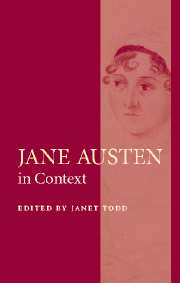36 - Rank
Published online by Cambridge University Press: 19 December 2020
Summary
Mr Elliot's bland assertion that ‘rank is rank’ (P, 2:4) makes plain the gulf between Jane Austen's characters and first audience, for whom rank is an intricate but self-evident system of social organisation and signification, and modern readers, for whom the nuances and gradations of the system are often obscure. Social position is of consuming importance in the novels, with individuals and families measuring their relative standings to the finest degree while devising long-term strategies for advancement in status. Yet these concerns are articulated in terms predating the class-based language of politics that grew up among radicals such as Paine, Spence and Thelwall in the 1790s, became consolidated in the work of social theorists such as Robert Owen and David Ricardo in the 1810s and 1820s, and continues to shape modern assumptions. The term ‘class’ was already current by Austen's day – P. J. Corfield cites a writer of 1753 who itemised English society in ‘five Classes; viz. the Nobility, the Gentry, the genteel Trades (all those particularly which require large Capital), the common Trades, and the Peasantry’ – but as an organising concept it was yet to diverge significantly from traditional specifications of rank, station or degree. ‘Rank’ remained the established model, and dictated conventional thought. Where ‘class’ would be measured in terms above all of productivity and income, locating individuals in socio-economic positions attained through material success, ‘rank’ placed primary emphasis on lineage, implying that social status was more or less inalienably conferred by birth and descent. Where ‘class’ brings with it overtones of structural antagonism and conflict, moreover, ‘rank’ suggested stratifications that were harmonious, orderly and stable – ranks being nothing if not serried. For Samuel Johnson, who teased the genteel republican Catherine Macaulay by inviting her servant to dinner (‘She has never liked me since’), social hierarchy was guaranteed by ties of interdependence and mutual advantage, and consisted of ‘fixed, invariable external rules of distinction of rank, which create no jealousy, as they are allowed to be accidental’ (i.e. given).
- Type
- Chapter
- Information
- Jane Austen in Context , pp. 387 - 396Publisher: Cambridge University PressPrint publication year: 2005
- 2
- Cited by



